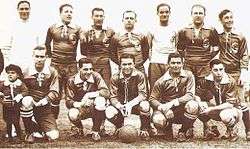Manuel Seoane
|
Seoane with the Argentina jersey in 1923. | |||
| Personal information | |||
|---|---|---|---|
| Date of birth | 19 March 1902 | ||
| Place of birth | Piñeyro, Avellaneda, Argentina | ||
| Date of death | 21 August 1975 (aged 73) | ||
| Place of death | Quilmes, Argentina | ||
| Playing position | Striker | ||
| Youth career | |||
| 1918-1920 | Club Progresista | ||
| 1920-1921 | Independiente | ||
| Senior career* | |||
| Years | Team | Apps | (Gls) |
| 1921-1923 | Independiente | (Total below) | |
| 1923-1925 | El Porvenir | ? | (?) |
| 1925 | Boca Juniors | ? | (16) |
| 1926-1933 | Independiente | 264 | (241) |
| National team | |||
| 1924-1929 | Argentina | 19 | (14) |
|
* Senior club appearances and goals counted for the domestic league only and correct as of June 2012. | |||
Manuel Seoane (19 March 1902 - 21 August 1975), nicknamed La Chancha, was an Argentine football striker who played for Independiente and Argentina national team.
Seoane is considerered one of the best all-time players not only for Independiente but in Argentine football. He gained recognition from the media and fans for being a strategist and a team player, as well as highly technical with the ball. He was also an implacable striker, being Independiente's 2nd all-time topscorer after Arsenio Erico and 5th amongst Primera División topscorers. He later went on to become the manager of the Argentina national team between 1935 and 1937.[1]
Club career


He started playing at Club Progresista with 15 years old. After scoring two goals in a practise match, he joined Independiente, where he made his official debut on March 6, 1921 in a game against San Lorenzo. Seoane totalized two titles won with the institution that played at the Asociación Amateur de Football league.
Independiente won its first championship in 1922,[2] with a great impact on the media which nicknamed the team "Los Diablos Rojos" ("The Red Devils"). The Devils has remained since as a trademark for Independiente players and supporters. That team was formed by notable players as Raimundo Orsi, Zoilo Canavery, Alberto Lalín, Luis Ravaschino and Seoane himself.
Seoane went on to score 241 goals for the club in 264 appearances. He finished as the Primera División top scorer on three occasions (1922, 1926 and 1929) during his career. He also won several titles with Independiente, including the Argentine championships of 1922 and 1926.
In 1923 he was sent off after an incident with a referee, this led to his suspension from the "Asociación Argentina de Football" league and his move to join El Porvenir, which played in the rival league "Asociación Amateurs de Football".
During his time with El Porvenir he made his debut for the Argentina national team, where he formed the forwards line with Cesáreo Onzari.
In 1925 Seoane joined Boca Juniors on its successful tour on Europe hitting 16 of the 40 goals converted by the team.
Once the punishment ended, he returned to Independiente in 1926, winning the title with the club that same year apart from being the topscorer with 76 goals.[3]
He continued playing for Independiente until his retirement in 1933 due to his overweight problems. On August 22, 1934, the club organised a match in his honour and made a collection to buy him a house.[4]
Seoane played for Argentina between 1924 and 1929, appearing in 4 Copa Américas (1924, 1925, 1927 & 1929).[5] He was part of the winning team in 1925 1927 and 1929 and he was also the top scorer in 1925 with 6 goals.
Seoane went on to have a successful career as a football manager, he was manager of Argentina between 1934 and 1937. During his last years, Seoane was in charge of the Independiente's campground located in Quilmes, Buenos Aires, after retiring from the textile industry where he had worked.
Manuel Seoane died in Quilmes on August 21, 1975. He was 73.[6]
Titles
Club
National team
- Copa América (3): 1925, 1927, 1929
References
- ↑ "Los 40 nombres que dirigieron la Selección Nacional" on AFA website
- ↑ Argentina 1922 - RSSSF
- ↑ Argentina Primera División 1926 - RSSSF
- ↑ "Manuel Seoane, el excepcional goleador", Libro del Fútbol, 3 June 2010
- ↑ rsssf: Argentina Copa América squads
- ↑ "Biografía de Manuel Seoane", Somos Diablos website
External links
- Futbol Factory profile at the Wayback Machine (archived October 20, 2007)
